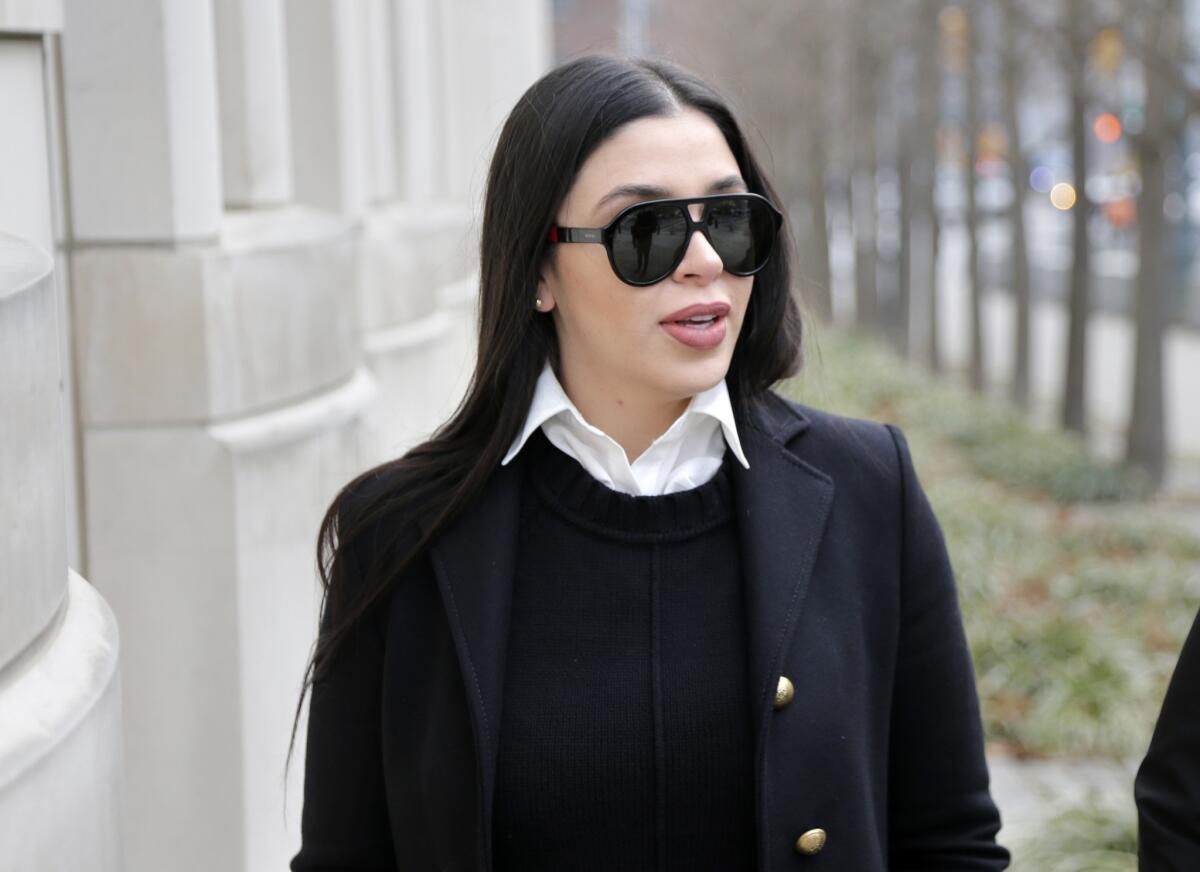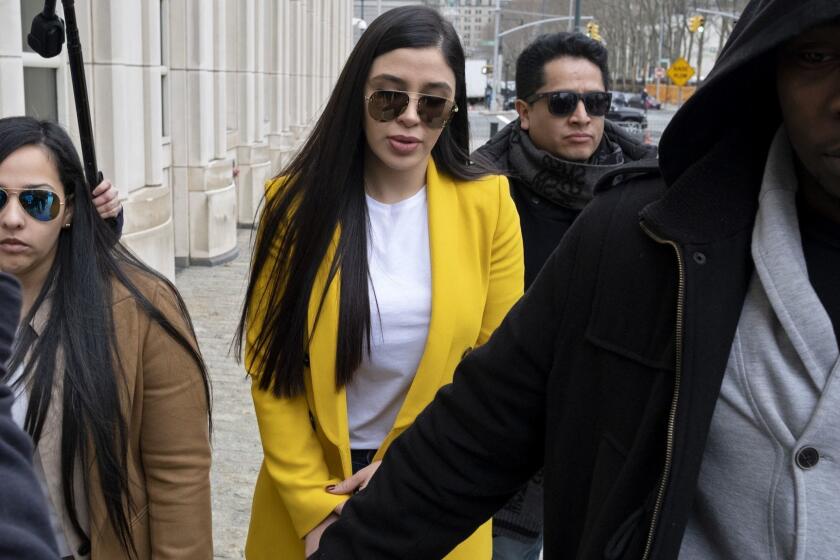Commentary: El Chapo’s wife doesn’t want your judgment. ‘Cartel Crew’ won’t help
Emma Coronel Aispuro, the wife of convicted Sinaloa Cartel chief Joaquín “El Chapo” Guzmán, made her debut appearance on the VH1 “documentary” series “Cartel Crew” on Monday night.
Like the network’s “Mob Wives,” which ran for six seasons, and A&E’s “Growing Up Gotti,” “Cartel Crew” follows the adventures of the near relations of jailed or deceased organized crime figures. The premise here is that cast members — mostly Miami-based sons and daughters of Latin American drug lords — are trying to lead more honest lives than their parents, and though some have done time themselves, at the moment of filming they are all, strictly speaking, legit — working straight jobs as stars of a reality TV show, trading their hot messiness for a sort of celebrity.
Although some eyebrows were raised when the episode — or possibly, episodes — was announced, including Sen. John Kennedy’s (R-La.) call for VH1 to cancel the show, this is not new territory for television. Netflix and Univision coproduced three seasons of the docudrama “El Chapo,” which includes a fictionalized version of Coronel; and Guzmán is a supporting character in “Narcos: Mexico,” another Netflix production. (Alejandro Edda, who plays him on that series, attended Guzmán’s trial in February and got a wave from the defendant. “I was just paying respect to him,” he told the New York Times.) And also from Netflix: “The Day I Met El Chapo,” a docuseries in which Mexican actress Kate del Castillo, who played a drug trafficker in the telenovela “La Reina del Sur,” recounts her role in arranging for Sean Penn to interview Guzmán for Rolling Stone. (An American version of that telenovela, USA’s “Queen of the South,” has been renewed for a fifth season.)
Our prurient interest in criminals is nothing new. (Shakespeare wrote some memorable monsters.) Neither is our uncertainty over how to regard them. The folk song “Jesse James” celebrates the outlaw as a killer and a man of feeling in the same verse, just as Mexican narcocorridos tell tales of modern drug-running outlaws. (There are many about or from the point of view of El Chapo.) “Scarface” was a hit for Paul Muni in 1932 and Al Pacino in 1983; Warren Beatty starred in sympathetic film biographies of Clyde Barrow (of “Bonnie and”) and Bugsy Siegel. Martin Scorsese has directed a significant part of his energy toward putting organized crime on-screen in a way that effectively if not technically glamorizes it. Charles Manson — don’t get me started. And, of course, there is “The Godfather,” which gave one “Cartel Crew” star his name — Michael Corleone Blanco, the son of “Cocaine Godmother” Griselda Blanco, who was deported to Colombia and killed there. Reportedly, there were three feature films and an HBO series in the works about her at the time.
Emma Coronel, wife of convicted Mexican drug lord Joaquín “El Chapo” Guzmán, will appear in the second season of VH1’s reality series “Cartel Crew.”
Indeed, the shining edifice that is Platinum Age Television has been erected on the back of gangsters: “The Sopranos” — without which there surely would have been no “Mob Wives” — is routinely praised as the beginning of it all and the greatest series ever. (Unless it was “The Wire,” routinely praised as the greatest series as well. Or “Breaking Bad,” also routinely praised as the greatest series ever.) Both “The Sopranos” and “Breaking Bad,” as well as later entries like “Animal Kingdom” and this year’s fact-based “Godfather of Harlem,” are more interested in the fortunes of their antiheroes than the wider implications of their professions. All that mattered was whether Tony Soprano or Walter White would escape capture or killing to live another season of television. (I was, to be contrary about it, glad to see those characters go, though I would be happy enough to believe that Carmela and the kids survived that final “Sopranos” blackout, perhaps to star in a reality show.)
I watched a few previous episodes of “Cartel Crew” to better understand what I’d be seeing Monday night, and in most ways, the series is standard-issue reality TV: a cycle of sometimes physical arguments and stage-managed reconciliations resetting the stage for further arguments and so on, interspersed with Serious Conversations between Best Friends and Big Events likely to be spoiled by one or another cast member’s unruly behavior. As elsewhere in reality TV — and for that matter, much of modern society — there is an exaggerated concern over whether one is being respected or disrespected, alongside sentimental celebrations of friendship, love and loyalty.
I am quite prepared to believe that any of these people, in a different context, might prove to be more complex and less ridiculous than “Cartel Crew” often makes them seem and to acknowledge that many viewers — not to say the stars themselves — will not find them ridiculous at all but inspiring in ways I cannot quite imagine. (Others may find them ridiculous but funny.) None wants to be judged; all are judgmental. At times, a thoughtful person will emerge from behind the bluster, but from “Laguna Beach” to “Floribama Shore” and through all the many cities where Real Housewives strut and fret their hour upon the stage, thoughtfulness is not what draws people to these series. There are plenty of straightforward documentaries on self-reformation and trying to live a better life than the one you came from (Lynn Novick’s two-part “College Behind Bars” comes your way via PBS on Nov. 25 and 26), and they can be plenty dramatic, but it is not Big D drama, the true-life Alexis versus Crystal confrontations that make this sort of reality show catnip to some and anathema to others.
Bravo built its brand on “Real Housewives” and other addictive reality soaps. With the inaugural BravoCon, it gave fans an event worthy of pilgrimage.

Not surprisingly, Coronel’s appearance, teased throughout the show, was held back until the end of the hour, which began with Blanco receiving mysterious phone calls from Coronel’s lawyer. She wants to meet. Whether or not Blanco knew this was coming — his girlfriend, Marie Ramirez De Arellano, looked authentically surprised, at least — one would wager the plot point had been passed around the “Cartel Crew” production office before any of the people on camera heard or thought of it.
“When a boss calls you for a sit-down, you show up and you sit down,” says Blanco.
“I can totally relate to her, being with somebody that has that stigma,” Ramirez De Arellano says on the way to the meeting. “If there’s people that can show her that there is a way, it’s us.”
The sit-down is on the deck of a fancy white boat, where the three drink what looks like Champagne and converse in (subtitled) Spanish. The guests seem a little star struck. The hostess, friendly and composed, gives off an air of money, tastefully employed.
“It’s an honor to be here next to you,” says Blanco, and Coronel returns the compliment.
They discuss their woes in general terms. Coronel says she tries to stay positive. Blanco observes that “life is full of pain” and that you have to learn to balance things sometimes. Coronel avers that it “has made us stronger people. We know how to identify people better,” that is, who one’s friends are. All agree they don’t have many. “It’s sad that they judge us without knowing us,” Coronel says.
“Sometimes you just want to do what you see other people do. We want to be normal.”
“We are normal,” says Blanco.
“Yes, we are human,” says Ramirez De Arellano.
The purported reason for the meeting — the actual reason for the meeting, of course, is to film a scene for “Cartel Crew” — is that Coronel wants to start a clothing line “in Joaquín’s name”; she’s heard that Blanco has one of his own “that is about your mother” and wonders about his process. (His “clothing line,” Blanco Puro, which does feature images of Griselda Blanco, is your usual assortment of mail-order branded T-shirts and hoodies, along with mugs and phone cases; it is not a likely model for whatever it is Coronel, whose high style was a subject for comment during the El Chapo trial, has in mind.) He tells her that people will give her a hard time and not pay their bills.
Finally, Ramirez De Arellano asks for advice on travel to Mexico. The women of “Cartel Crew” are going to a demonstration against refugee detention and child separation in San Diego and might cross the border into Tijuana, and she’s “a little afraid.” That cartel violence has something to do with this situation and that everything Coronel has is bought with others’ blood and misery is an irony that eludes them all. Perhaps that will change when “Cartel Crew” visits the border next week. Or perhaps not. Not judging!
Judging a little.
More to Read
The complete guide to home viewing
Get Screen Gab for everything about the TV shows and streaming movies everyone’s talking about.
You may occasionally receive promotional content from the Los Angeles Times.








